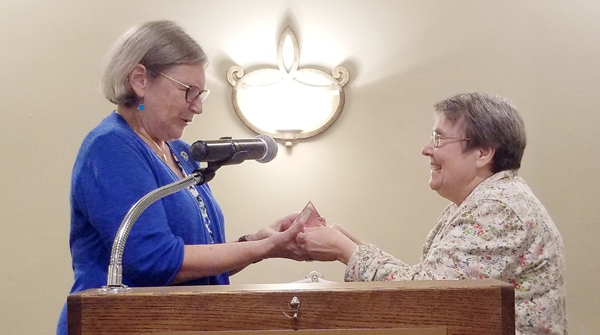
Sister Janice Cebula, right, president of the Clinton Franciscans, presents the 2019 Clare Award to Sister Simone Campbell, SSS, July 14 at Tuscany Special Event Center in Clinton.
By Lindsay Steele
The Catholic Messenger
CLINTON — What could a 13th century contemplative, cloistered nun and a 21st century leader of Nuns on the Bus share in common? “I think we’d be surprised at the similarities,” Sister Janice Cebula, president of the Clinton Franciscans, said as she prepared to present the 2019 Clare Award to Sister Simone Campbell, SSS on July 14.
The 13th century was a time of great economic and political change, Sr. Cebula explained. “In the midst of all this, those who were poor were abandoned, not unlike these changing turbulent times when we are experiencing rapid change in the economic systems and the political systems and those who were on the margins are rapidly being left behind even more.”
“Clare (the 13th century nun) reached out to those left out of society.” Likewise, “Sr. Simone is an unwavering example of persistence and tenacity for equity, justice and systemic change.” Both women served as a light in dark times, Sr. Cebula said.
The Sisters of St. Francis of Clinton present the Clare Award every fourth year. The award honors a woman who exemplifies the characteristics of St. Clare of Assisi and the values of the Clinton Franciscans: to live and promote active nonviolence, pursuing peace with justice in right relationship with all creation.
Sr. Campbell, a member of the Sisters of Social Service, has served as the executive director of NETWORK Lobby for Catholic Social Justice since 2004. The religious leader, attorney, poet and author has led six, cross-country “Nuns on the Bus” tours to raise awareness for social justice issues. In 2014, she received the Pacem in Terris Peace and Freedom Award in Davenport.
In accepting the Clare Award, Sr. Campbell focused on empowering those gathered in the Tuscany Special Events Center. “I’m so honored by this award, but I’m only the name tag,” she said. “What I really want to acknowledge is that this moment is a moment of deeper community.
It’s really important that we don’t make the mistake of thinking it is one individual. … We know we are empowered, together, to make a difference.”
She described St. Clare as someone who was a “disrupter” of the status quo. “She was anchored in the deeper truth of a God alive in our midst who stays ever present.… She worked against wealth disparity, she worked against the corruption in the church. She worked to create another way of life for women other than the monastic model. She stubbornly held on with good feminine leadership.”
Sr. Simone encouraged those in the room to be “disruptors,” to bring about change that is necessary for a just society. She offered five characteristics of feminine intelligence, a concept she learned about while attending a women’s conference at the Vatican, as a way to bring about change for the common good. She stressed that feminine intelligence does not apply exclusively to the female gender. Both genders can benefit from its application.
• Feminine intelligence is inclusive; it does not leave people out.
Sr. Campbell gave an example of how she used to lobby then-House Speaker Paul Ryan. She would tell him about the people who would be hurt by policies or programs he proposed and he would respond by telling her they weren’t his target. “But they are going to be your victims,” she replied.
• Feminine intelligence requires you to listen.
The temptation is to spout off and think about what you want to say next. “I’ve come to learn that listening is probably the most important political action we can do. Listening to stories that are not our own,” she said. NETWORK recently conducted its eighth rural round table to hear the stories of rural America. Sr. Campbell urged her audience to consider “Where can you listen? Where can you invite stories you might not hear otherwise? It’s a spiritual discipline to listen.”
• Feminine intelligence is seeing that things are interconnected.
Sr. Campbell referred to weather woes – flooding in one place, drought in another. Feminine intelligence is more likely to see those connections. Politicians aren’t likely to see them, unless those connections are pointed out to them, she said.
• Feminine intelligence is about compassion, empathy that moves to action.
“I think that is probably the key that is missing in political discourse,” Sr. Campbell said. “Compassion means we see that everyone has something to offer.”
• Feminine intelligence knows regeneration.
“We know that when something dies it is not the end of the story,” Sr. Campbell said. “We aren’t the end of the story. Regeneration happens. The light continues beyond us. We are the gifts to the next generation.”
The disrupting element of women’s leadership is needed now, she said. “I think we are all called to that.”
Award ceremony videos
Videos of Sr. Cebula and Sr. Campbell speaking at the Clare Award ceremony can be found at www.youtube.com/user/catholicmessenger.











